Perform a free Arizona warrant search today using the steps and links laid out throughout this resource.
Thanks to state and federal public record laws, finding warrant information at no cost comes down to knowing the right places to look. Because warrants should be addressed as promptly as possible, checking for them from time to time is recommended.
This resource addresses how to identify warrants across the state of Arizona and provides links to searchable databases, contact information for local agencies that host these records, and even guidance on resolving a warrant if one has been issued for you.
Are Warrant Records in AZ Publicly Available?
All government officials and public bodies must maintain records of their official activities, and these records are considered public in the state of Arizona.1 A.R.S. section 39-121 grants the public the right to review public records in person and to obtain copies.2
Because granting and executing a warrant involves public officials, these records are often attainable if individuals know where to look and where to request them from.
In many cases, they can be requested or viewed online. In others, agencies holding the documents may require formal requests, a phone call to the right department or an in-person visit.
Several types of warrants exist, and the type of warrant may influence when and whether it’s accessible. In some cases, disclosing warrant information prior to it being acted upon could hinder law enforcement and may not be available until afterward.
Necessary Details To Locate Warrants in Arizona
When performing a warrant search, it’s important to be as specific as possible in your requests. This helps limit the scope of potentially relevant records, which can streamline the process.
At a minimum, individuals will need to know a first and last name to perform their search in most cases, though some databases will yield results with partial names. When using partial names, more records are likely to be pulled, meaning there will be more records to sift through to identify the right one.
Beyond a legal name, it’s useful to know where the warrant was issued or the state in which the individual lives. Further narrowing down searches can be done by having a person’s date of birth.
Information about warrants may be available from several agencies across various levels of government. In many cases, information can be found at no cost, but some may charge fees associated with the cost of locating and copying the records.
Choosing the relevant agency or department often helps speed up the search process, and generally, it’s best to search broadly via state or federal records and slowly narrow the scope of the investigation to county and municipality. It can also help to know which kind of warrant has been issued, as there are several. However, most appear through the same search processes, and details on the common types of warrants are detailed below.
How To Conduct a Free Arizona Warrant Search on Yourself or Someone Else
The Arizona Judicial Branch offers the Public Access to Court Information tool, which reports information from 177 out of 184 courts.3
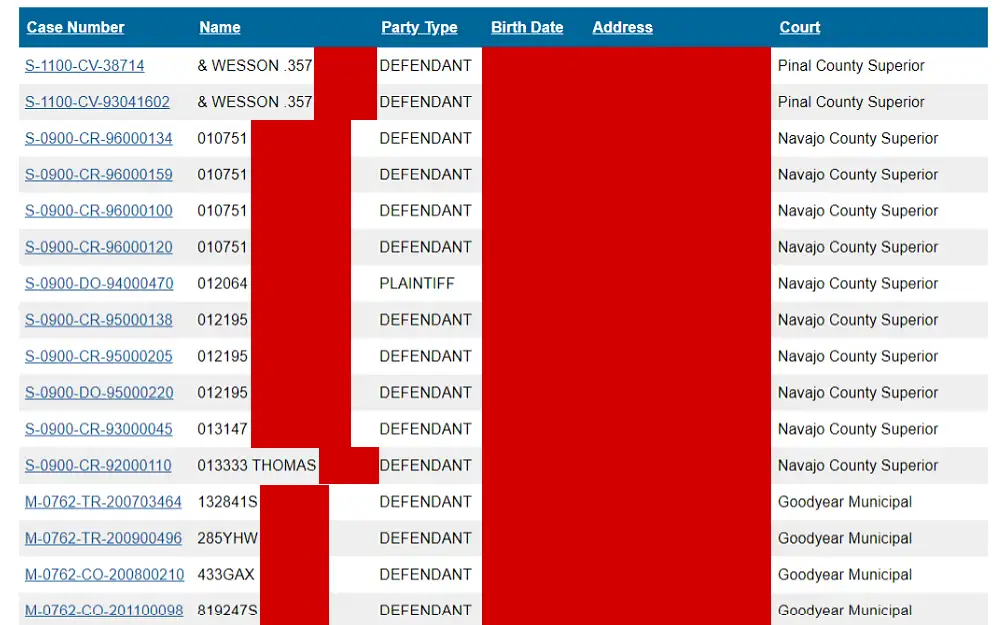
Users should note that it doesn’t report on state-level courts or on certain courts located in Maricopa or Pima counties.4 Once a case has been located, contact information can be found using the AZ Courts Locator, which lists all courts throughout the state.5
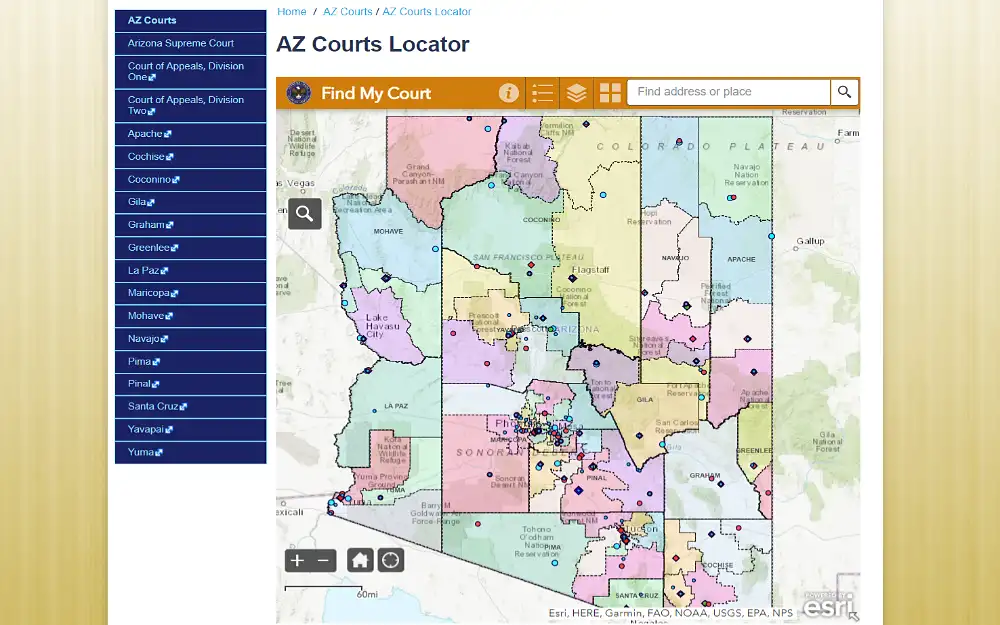
To complete a search using the Public Access to Court Information tool, individuals have two primary options: searching by name or searching by case number. When selecting the name option, a last name is required, while the first name, date of birth and court can help narrow the scope of the search.
When searching by case number, individuals must enter the associated case number and select the court they believe the records are at.
If this tool doesn’t pull up records on an individual, it doesn’t necessarily mean they have no outstanding warrants. Certain case information isn’t included within the database, including those involving sealed cases, mental health and juveniles. Likewise, it won’t include charges related to local ordinance violations.
Records across the state can also be located by phone. The Arizona Judicial Branch recommends using the Find My Court tool to identify the correct Superior, Municipal or Justice Clerk of the Court to inquire about warrants.
It’s also possible to contact the Arizona Department of Public Safety at (602)-223-2233 while performing a warrant search. During the call, ask about outstanding warrants for the individual you’re researching. You may be asked for a case number, birth date or Social Security number if you have them.
Search for Warrants via County Agencies & Courts in Arizona
Sometimes, warrant searches take searchers to individual counties rather than a statewide database. In most cases, information can be found using the Public Access to Court Information tool, especially by selecting the relevant county. However, it’s possible to request this information directly from the courts or departments in charge of the records.
Below are the three most populous counties in the state and how countywide warrants can be located:
Anyone can freely see who’s wanted in Maricopa County, as long as they know where to find the information they’re seeking. Using the Maricopa County Online Warrant Lookup Tool, requestors must insert a partial or complete name to begin the search.6
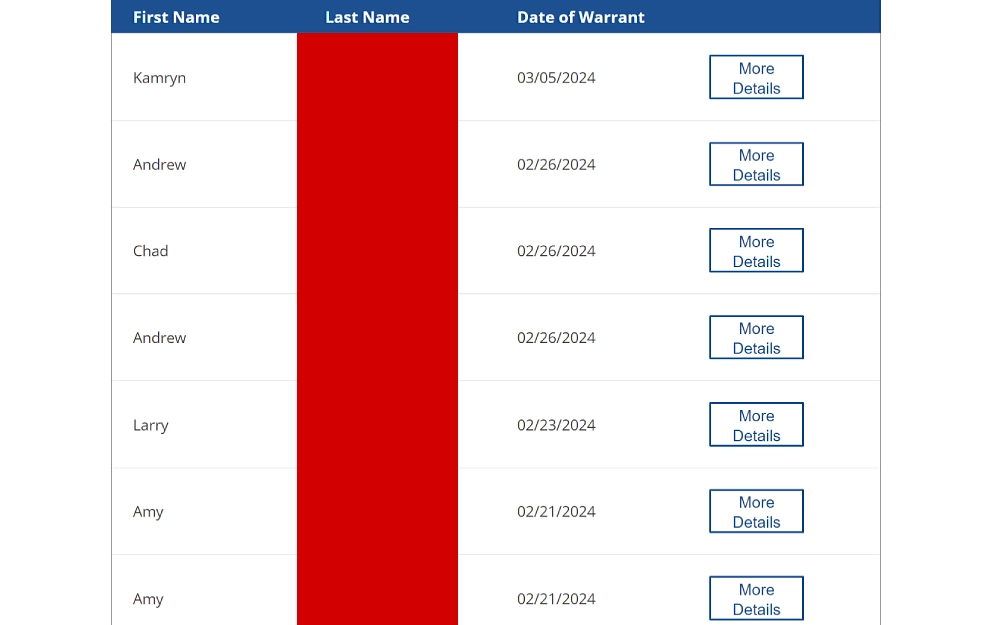
It can be further narrowed down by selecting the agency that issued the warrant in question, a city or a ZIP code.
Maricopa County Sheriff’s Office
550 West Jackson Street
Phoenix, AZ 85003
Phone: (602)-876-1000
Upon searching, information that may be displayed includes address, sex, birth date, a physical profile of the individual, the name of the warrant, a warrant ID and the offense. It’s also possible to send a tip about the individual’s whereabouts within the tool.
Warrants in Pima County can also be identified through the Public Access to Court Information tool using the instructions previously provided.
Pima County Sheriff’s Department
1750 East Benson Highway
Tucson, AZ 85714
Phone: (520)-351-4900
Email: [email protected]
Like Pima County, Pinal County has no dedicated warrant lookup tool. Records can be located through the Public Access to Court Information tool.
Pinal County Sheriff’s Office
971 Jason Lopez Circle
Florence, AZ 85132
Phone: (520)-866-5111
Retrieve Arrest Warrant Details via Municipalities in AZ
Some arrest warrant details may be available within the municipalities where they were issued.
These records can typically be found through the Public Access to Court Information tool but may also be available from municipal courts or their clerks or from police departments. Below are the most populous cities within Arizona and where to request warrant details within them.
Records can be requested from the Phoenix Municipal Court for $0.50 per page. Certified copies can be provided for an additional $17. It takes 3 to 5 business days to process requests. Likewise, researchers can use the online Request for Phoenix Municipal Court Records to submit their request.7
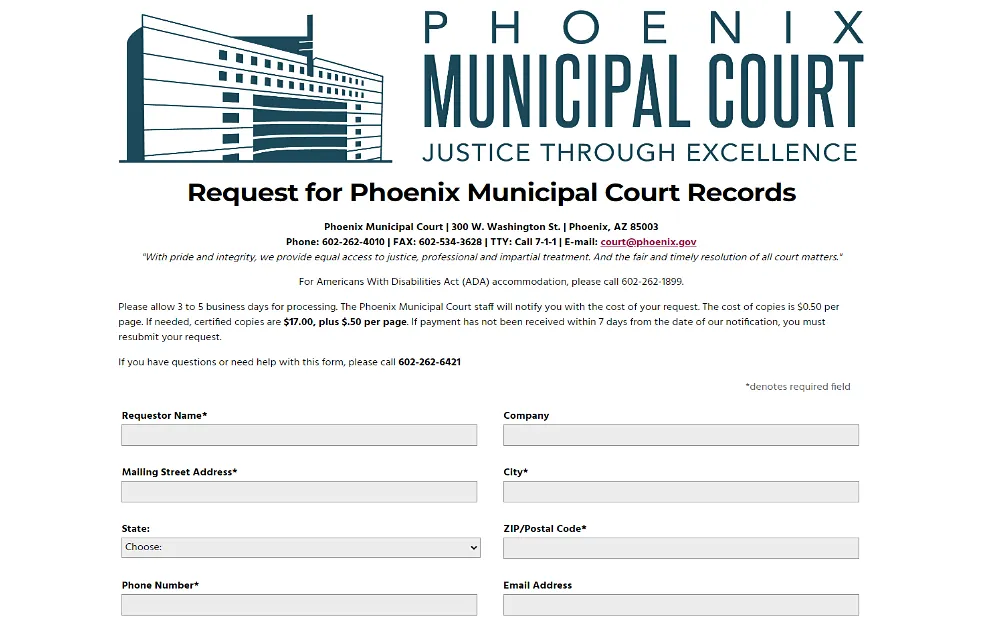
If an order for arrest is discovered, the court also has an online guide for quashing warrants detailing what to do to resolve it.
Phoenix Municipal Court
300 West Washington Street
Phoenix, AZ 85003
Phone: (602)-262-6421
Fax: (602)-534-3628
Email: [email protected]
Warrants in Tucson may appear using the Quick Defendant Public Search tool.8 This tool pulls up court information, including disposition, which may list issued warrants.
If no case information can be found using the Quick Defendant Public Search tool, it’s possible to use the online Request a City Court Record tool for a fee of $0.50 per page.9
Tucson City Court
103 East Alameda Street
Tucson, AZ 85701
Phone: (520)-791-4216
Fax: (520)-791-5454
Email: [email protected]
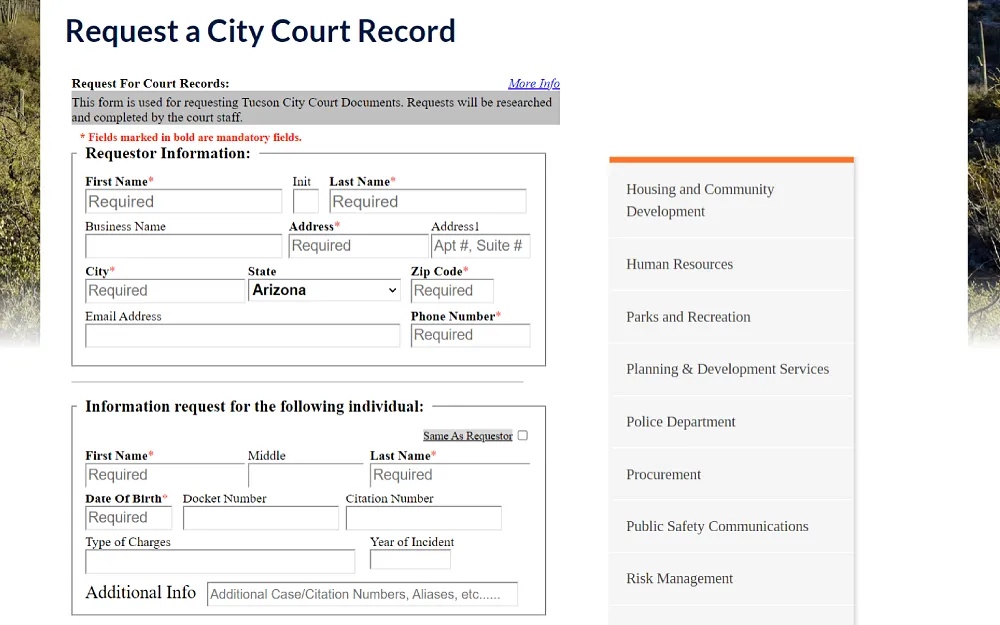
In Mesa, individuals can inquire about warrants with the municipal court’s customer service. This requires individuals to check in, and if a warrant is discovered, the individual may be arrested, so proceed with caution.
Mesa Municipal Court
250 East 1st Avenue
Mesa, AZ 85210
Phone: (480)-644-2255
Fax: (480)-644-2927
The Chandler County Court Case Search tool allows for searches by case number or by name.10 A minimum of the first two letters of the first name must be included.
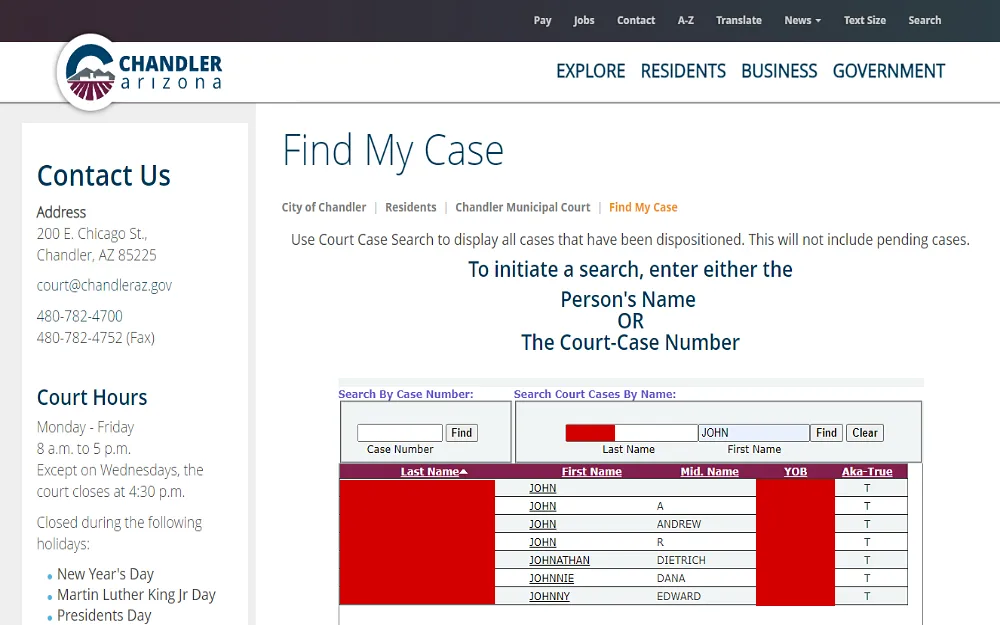
While browsing records, disposition codes are included. A code of 56 means the defendant failed to appear in court, and a warrant of arrest was issued.
Chandler Municipal Court
200-East Chicago St.
Chandler, Arizona – 85225
Phone: 480.782.4700
Fax: 480.782.4752
Email: [email protected]
The Gilbert Municipal Court Public Access Portal provides online court records and a court calendar. To identify warrants, individuals should enter a last and first name and then review the results.
Upon opening the results for an individual, it’s possible to check for warrants by reviewing the menu on the left-hand side of the window under “Defendant” by selecting “Warrants.” This will review the status of the warrant, the issue date, the warrant number and the total bond.
Gilbert Municipal Court
55 East Civic Center Drive
Gilbert, AZ 85296
Phone: (480)-635-7800
Fax: (480)-635-7820
Check for Federal Warrants: Arizona & All Other U.S. States
Federal warrants aren’t particularly common, but they do arise from time to time. The most straightforward way to identify a federal warrant is by searching through federal fugitive and wanted lists. The highest priority federal fugitives can be found on the following lists:
- FBI’s Ten Most Wanted Fugitives11
- DEA’s Most Wanted Fugitives
- U.S. Marshals Service 15 Most Wanted Fugitives
Another option for viewing federal arrest and search warrants is using the Public Access to Court Electronic Records (PACER) tool. This tool allows access to over 1 billion documents filed in federal courts, allowing individuals to search for cases in federal court.
However, this tool requires individuals to create an account. Each document also comes with a $0.10 per page fee.12
Individuals may also opt for a FOIA request via the U.S. Marshals Service, the department responsible for executing federal warrants. This can be done with a criminal defense attorney well-versed in identifying and fighting warrants. Be aware that FOIA requests through the U.S. Marshals Service come with fees based on the number of pages and the hourly search fee for the personnel who must perform the record retrieval.
Warrant Types in Arizona & Their Definitions
Before performing a warrant search, it’s important to understand what they are. A warrant is a legal authorization to take a specific action, such as arresting an individual or searching through spaces or belongings (such as homes or vehicles) that would normally be considered private and require consent.
Typically, they’re issued by a judge or a court and then enforced by a sheriff, a police officer or another individual with legal authority.
In most cases, warrants don’t expire until they have been resolved, quashed or canceled. This means an individual who has a warrant from years prior may be arrested upon coming into contact with law enforcement and having to identify themselves, making it crucial to resolve them as soon as they’re detected to avoid a detrimental impact on day-to-day life.
Warrants may be issued for several reasons, so long as a judge has reason to believe there’s a valid reason for them. The list below includes the most common ones and why they may be issued.
- Search Warrants: Search warrants allow law enforcement to enter and search a listed place for evidence. If law enforcement discovers evidence pertaining to a criminal case, it may be seized. A judge must receive probable cause that the listed location contains evidence.
- Arrest Warrants: An arrest warrant calls for the arrest of the named individual and may only be granted if a judge has received a probable cause that an individual has committed a criminal offense. These are typically issued based on evidence by an attorney or peace officer or after a grand jury indictment. Officers must make an arrest once they receive a warrant.
- Bench Warrants: In some cases, actions an individual chooses to take result in failing to follow court orders. A judge may order a bench warrant to detain them until they can be brought into court. They’re most commonly given after a failure to appear for a scheduled court date or a probation violation.
- Capias & Capias Pro Fine Warrants: Capias warrants are issued after an individual with a guilty judgment fails to complete their specified conditions. A capias pro fine warrant refers to a failure to pay a fine. Individuals arrested on these warrants must either pay the fine or serve time in jail until they’ve earned enough jail credit to satisfy the terms of their conditions.
- Fugitive Warrants: Sometimes referred to as an extradition warrant, these warrants call for the return of a fugitive to the jurisdiction they’re wanted in.
- Probation & Parole Violation Warrants: When someone on probation or parole violates the terms of their supervision, a warrant will be issued for their arrest. This warrant will remain until it is handled, either by proving that the terms weren’t violated, appearing to have the warrant dismissed or applying for a legal discharge.
- Traffic Warrants: Individuals who have traffic tickets or citations who don’t pay the fines or appear in court may have a traffic warrant issued in their name until the situation is resolved.
- Child Support Warrants: Arizona allows for warrants to be issued for individuals evading child support when certain conditions apply, including that the individual was ordered to appear by the court, received notice of the order and failed to appear.
Any warrant that is outstanding is considered active. An active warrant won’t disappear until it’s satisfied or quashed, so it’s important to handle them promptly.
Actions To Consider If You or Someone Else Is Issued a Warrant in Arizona
If a warrant search reveals that you or someone you know is currently wanted by the court system, it’s imperative to address the issue immediately. If the individual with a warrant is a friend, family member or acquaintance who can be trusted, it’s a good idea to inform them of their current legal status. This gives them a chance to prepare and handle the warrant accordingly.
However, if you’re worried for your safety or the safety of others, contact the local county tip line if a crime isn’t currently being committed. If the warrantee is actively committing a crime, contact 911.
If you discover a warrant in your name, you have three primary routes you can take to handle it. It’s strongly recommended that individuals with warrants seek out legal council as soon as they know a warrant has been issued. This allows them to begin navigating the complicated legal system.
A lawyer will be able to advise those with warrants on the best course of action to take and how to mitigate or avoid long-term impacts from an arrest.
A lawyer isn’t required to handle a warrant, and individuals may choose to approach them pro se. This often involves either paying any fines associated with the warrant or setting a court date to handle it.
The third option is for the individual to turn themselves in. Prior to doing so, it’s recommended to get all pertinent affairs in order. This includes contacting family members and making arrangements for a potential arrest, such as ensuring children or pets are cared for or protecting the individual from job loss.
Contacting a bail bondsman in advance after an Arizona warrant search reveals an outstanding warrant can also help streamline the process and limit the length of time spent in custody.
Find more information on anybody in the state via the instructions for accessing free Arizona public records (vital records, court proceedings, inmate details, and much more) and the AZ arrest and criminal record lookup tutorial.
References
1Arizona Ombudsman Citizens’ Aide. (2024, March 09). Public Records – Overview. Retrieved March 12, 2024, from <https://www.azoca.gov/open-meeting-and-public-records-law/overview/>
2Arizona State Legislature. (n.d.). 39-121.01 – Definitions; maintenance of records; copies, printouts or photographs of public records; examination by mail; index. Retrieved March 12, 2024, from <https://www.azleg.gov/ars/39/00121-01.htm>
3Arizona Judicial Branch. (2024). Public Access to Court Information. Retrieved March 12, 2024, from <https://apps.supremecourt.az.gov/publicaccess/caselookup.aspx>
4Arizona Supreme Court. (n.d.). Public Access – Unavailable Courts. Retrieved March 12, 2024, from <https://apps.supremecourt.az.gov/publicaccess/courtsnotinc.aspx>
5Arizona Judicial Branch. (n.d.). AZ Courts Locator. Retrieved March 12, 2024, from <https://www.azcourts.gov/AZ-Courts/AZ-Courts-Locator>
6Maricopa County Sheriff’s Office. (2024). Lookup Warrant. Retrieved March 12, 2024, from <https://www.mcso.org/i-want-to/warrant-lookup>
7Phoenix Municipal Court. (n.d.). Request for Court Records. Retrieved March 12, 2024, from <https://www.phoenix.gov/court/recordsrequest>
8Tucson City Court. (n.d.). Court Defendant Search. Retrieved March 12, 2024, from <https://www.tucsonaz.gov/Departments/Tucson-City-Court/Search-for-Court-Defendant>
9Tucson City Court. (n.d.). Request a City Court Record. Retrieved March 12, 2024, from <https://www.tucsonaz.gov/Departments/Tucson-City-Court/Request-a-City-Court-Record>
10Chandler Municipal Court. (2024). Find My Case. Retrieved March 12, 2024, from <https://www.chandleraz.gov/residents/chandler-municipal-court/find-my-case>
11Federal Bureu of Investigation. (n.d.). Ten Most Wanted Fugitives. Retrieved March 12, 2024, from <https://www.fbi.gov/wanted/topten>
12Public Access to Court Electronic Records. (n.d.). PACER Pricing: How fees work. Retrieved March 12, 2024, from <https://pacer.uscourts.gov/pacer-pricing-how-fees-work>
